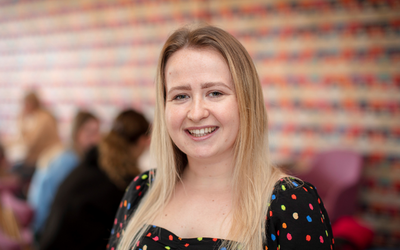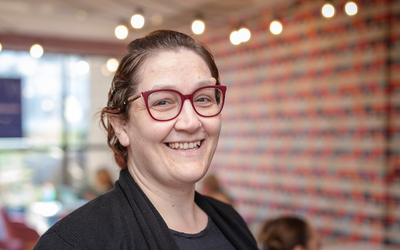You are here
- Home
- External Events and Publications
- Biennial APS Conference
- APS Conference 2023
- Conference programme
- The non-negotiable: how student-led academic spaces foster adaptable, accessible and inclusive learning within the shifting landscape of HE
The non-negotiable: how student-led academic spaces foster adaptable, accessible and inclusive learning within the shifting landscape of HE
Joshua Manning, Cara Baer, Liz Staples and writing mentors (names TBC), University of Plymouth
Email: joshua.i.manning@plymouth.ac.uk
Session recording
Presentation
Abstract
For the last 10 years, the Writing Café has been a welcoming space for students to talk about academic writing across disciplines and to support them to become better writers, outside of formal academic confines, underpinned by the philosophy of inclusion and inquiry (Boud et al., 2013; Goodley, 2014). Whilst originally located within a physical café space, the Writing Café has been offering a simultaneous in-person and online service since the beginning of the 2021/22 academic year. This hybrid approach has actively incorporated the best practices learned from providing the Digital Writing Café throughout the Covid-19 pandemic. This was highlighted by the Gravity Assist report (Barber et al., 2021) as one of the most innovative examples of online peer support, which continues to inform our return to campus strategy to create a more flexible and accessible service.
Though the Writing Café was always a non-hierarchical space that helped to bridge the gap in supporting social mobility through demystifying academic writing practices to make them more accessible (Pritchard, 2015; Baer et al., 2023), this new flexible approach has seen a drastic increase in engagement with the service. This has been evident when comparing student attendance at the Writing Café between the hybrid and in-person only models, with 56% more students using the service last year, and an increased number of these students belonging to Access and Participation Plan (APP) categories.
This seminar will explore the value of offering a non-negotiable online and in-person service, and the accessibility benefits of continuing to deliver hybrid services, with over 60% of Writing Café engagement being digital in 2021/22, despite experiencing an institutional movement away from remote learning options. Our student Writing Mentors will share their experiences of offering hybrid academic-writing support and the benefits of this accessibility-driven approach, as well as discussing the impact on our student engagement. Participants will be encouraged to join the discussion about the benefits and challenges of running accessible, hybrid peer-to-peer academic support services, and share their reflections on the value of students as Writing Mentors to encourage a culture where students are valued as creators and distributors of knowledge.
References
Baer, C., Kearney, N. & Boote, J. (2023) ‘Creating the conditions for inclusion: How the Writing Café is facilitating accessibility for disability through mutuality and empowerment’, British Education Research Association Blog, 13 January. Available at: https://www.bera.ac.uk/blog/creating-the-conditions-for-inclusion-how-the-writing-cafe-is-facilitating-accessibility-for-disability-through-mutuality-and-empowerment (Accessed: 30/01/2023).
Barber, M., Bird, L., Fleming, J., Titterington-Giles, E., Edwards, E. and Leyland, C. (2021) ‘Gravity assist: propelling higher education towards a brighter future – Digital teaching and learning review', The Office for Students. Available at: https://ofslivefs.blob.core.windows.net/files/Gravity%20assist/Gravity-assist-DTL-finalforweb.pdf (Accessed: 30 November 2022).
Boud, D., Cohen, R. and Sampson, J. (2013) Peer learning in higher education: Learning from and with each other. Abingdon: Routledge.
Goodley, D. (2014) Dis/ability studies: Theorising disablism and ableism. Abingdon: Routledge.
Pritchard, C. (2015) 'Mentoring in the Writing Cafe: Identity, belonging and ownership, Journal of Learning Development in Higher Education, Special Edition: Peer Learning, 9th November.
Joshua Manning
Peer Learning Specialist, University of Plymouth
Josh is a Peer Learning Specialist managing three distinct peer-learning projects within the University of Plymouth, namely the Peer Assisted Learning Scheme (PALS), Pre-Sessional Ambassadors, and the Writing Café. In the last two years, both the Pre-Sessional Ambassador scheme and the Writing Café have been recognised as innovative examples of peer-led schemes that embed inclusion and belonging amongst both incoming and current student cohorts, highlighted in the 2022 Pearson report on Building Belonging in Higher Education and the 2021 Gravity Assist report respectively. Prior to working at the university, Josh was, himself, a Writing Mentor, working for 2 years within the Café as a student.
Cara Baer
PhD student, lecturer and researcher, University of Plymouth
Cara Baer is a PhD student, lecturer and researcher at the University of Plymouth (UK). She is also involved in the University of Plymouth’s Student Learning team as a Student Writing Mentor with the Writing Café. Her research interests are in equitable opportunities within higher education, including access to university and student experiences during their studies, particularly through a social justice lens. Cara has recently published about the Writing Café in a BERA blog and has an upcoming article (February 2023) in the Journal of Learning Development in Higher Education that explores the power of inclusion and social justice within peer learning spaces.
Liz Staples
BA (Hons) Education student, University of Plymouth
Liz Staples is a student studying BA (Hons) Education at the University of Plymouth. Her commitment to the students led her to obtain active and engaging roles as a Writing Mentor and Student Ambassador. She is an advocate for student voice and participation. Co-developing and leading the Opportunity Plymouth mentoring programme, together with awards and achievements reflect her research interests in widening participation, student experience, knowledge exchange and transformative learning. Having always been an active and dedicated student, she was awarded the SSTAR Course Representative of the Year Award and the Dr Mel Parker Award for her community education and inclusion work during the pandemic.
Writing mentors – further information to be provided in due course
Writing Mentors are trained student workers who support students attending the Writing Café to develop specific aspects of their writing and academic skills through facilitated conversations and activities. They seek to transform academic writing from a solitary activity into a peer-supported learning and development opportunity, aiming to increase the confidence of attendees by demystifying academic writing practices. Writing Mentors are recruited from subjects across the University, which brings a range of perspectives and approaches to the team, as well as coming from all levels of study.


